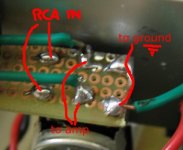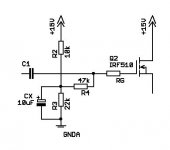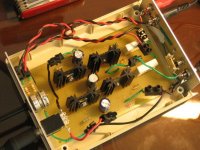I have finished building a headphone amplifier:
http://headwize.com/projects/showfile.php?file=szeke1_prj.htm
replacing r4 with an lm317 current source, as suggested in the project addendum
now, it has a good sound, but there's noise coming from the volume potentiometer: that is very low or nothing when it is full on or full off, but quite loud when the pot is about half
i tried to wire the case of the pot to ground, but it made it even worse... now I removed it, but it didn't change much
by the way, the noise is present on both channels at equal level
what should I do? i'm really thinking about removing it ...
i wired the first pin to ground, the middle goes to the amplifier circuit, and the last one is from the rca input
it's "reverse" wired, that is you turn the volume up counter-clockwise (but I don't think that's the problem)
any help?
thanks
Nicola
http://headwize.com/projects/showfile.php?file=szeke1_prj.htm
replacing r4 with an lm317 current source, as suggested in the project addendum
now, it has a good sound, but there's noise coming from the volume potentiometer: that is very low or nothing when it is full on or full off, but quite loud when the pot is about half
i tried to wire the case of the pot to ground, but it made it even worse... now I removed it, but it didn't change much
by the way, the noise is present on both channels at equal level
what should I do? i'm really thinking about removing it ...
i wired the first pin to ground, the middle goes to the amplifier circuit, and the last one is from the rca input
it's "reverse" wired, that is you turn the volume up counter-clockwise (but I don't think that's the problem)
any help?
thanks
Nicola
You might consider oscillations, i often had that if i had no inputfilter,
the amp oscillated when turning the inputpot to half volume.
If this is the problem, it goes aways with ~33pf-~100pf cap to gnd
after R1. If it does not change with this cap, the problem is somewhere else...
EDIT: Another possibility: The resistance of the inputpot might be too high,
did you use 100k ? If yes, try a 10k.
Mike
the amp oscillated when turning the inputpot to half volume.
If this is the problem, it goes aways with ~33pf-~100pf cap to gnd
after R1. If it does not change with this cap, the problem is somewhere else...
EDIT: Another possibility: The resistance of the inputpot might be too high,
did you use 100k ? If yes, try a 10k.
Mike
Amp
Hi:
DC thru the pot will cause noise. Is there any?
Why did you use the little PC board on the pot? It is not necessary and the wiring would be neater without it.
What kind of pot is it? An ohmite pot is a better design.
Hope this helps
Ed
Hi:
DC thru the pot will cause noise. Is there any?
Why did you use the little PC board on the pot? It is not necessary and the wiring would be neater without it.
What kind of pot is it? An ohmite pot is a better design.
Hope this helps
Ed
i tried to put a 68 pf capacitor as eds65gto said, but it was better as it was before
also, i tried bypassing the potentiometer and going directly to the amp circuit: no noise at all! sadly the volume is WAY too high, and I can't turn it down from the cdplayer ...
so, i restored the conncection as they were before, and I noticed that when i move my hands near the circuit, the noise gets somewhat louder
i don't think it comes from the power supply (it is a 15V 1.5A switching wall wart), anyway I added a 1mF cap in addition to the 0.1uF (C3) from the power supply.
any other ideas?
meanwhile, i'll try to change the psu to see if something changes
thanks for the help
Nicola
also, i tried bypassing the potentiometer and going directly to the amp circuit: no noise at all! sadly the volume is WAY too high, and I can't turn it down from the cdplayer ...
so, i restored the conncection as they were before, and I noticed that when i move my hands near the circuit, the noise gets somewhat louder
i don't think it comes from the power supply (it is a 15V 1.5A switching wall wart), anyway I added a 1mF cap in addition to the 0.1uF (C3) from the power supply.
any other ideas?
meanwhile, i'll try to change the psu to see if something changes
thanks for the help
Nicola
i forgot, it is hum...
i just tried to run it with another "heavier" 12v power supply.
noise is somewhat lower, but still present
... i think i'll have to build a power supply too
i just tried to run it with another "heavier" 12v power supply.
noise is somewhat lower, but still present
... i think i'll have to build a power supply too
When the wiper is in the middle position the pot represents a source with higher impedance (0.5 times its nominal value) than the stage driving it. So the middle positions of pots are prone to capacitively coupled noise (additionally to the aforementioned oscillation possibilities).
How long are your connections ? Are they properly shielded ? What is the input impedance of the stage "driven" by the pot ?
Regards
Charles
How long are your connections ? Are they properly shielded ? What is the input impedance of the stage "driven" by the pot ?
Regards
Charles
The problem is most likely that you don't have a very good ground return on the input of the circuit since you're apparently relying on the pot and it's wiring. I'd recommend an input termination resistor be installed in the circuit from R1 to the circuit ground to assure a good solid termination without any leads involved. Something around 50K is a standard value, but it would depend on what value you're using for the pot and what kind of load impedance you were trying for. I'm kind of surprised that was left off the schematic because it's fairly standard practice. You do have C1 in the circuit so that the input impedance doesn't effect the bias, right?
Dave
Dave
Phase_accurate:
i made the connections as short as I could, but using standard red/black wires ...
about the impedance of the amp stage, i don't know, however it's a mosfet source follower, so input impedance should be quite high
Black Heart
yes C1 is present
i'll try with a resistor from r1 to ground
thank you both for the replies 🙂
Nicola
i made the connections as short as I could, but using standard red/black wires ...
about the impedance of the amp stage, i don't know, however it's a mosfet source follower, so input impedance should be quite high
Black Heart
yes C1 is present
i'll try with a resistor from r1 to ground
thank you both for the replies 🙂
Nicola
Sorry, didn't notice that there was a link to the schematic. Yes, the FET stage has definitely a very high input impedance (at least at low frequencies) and is therefore prone to stray pickup.
regards
Charles
regards
Charles
Amp
If the noise is in fact hum then you need to tie the input jacks ground directly to the ground of the pot. The input jacks should be insulated from the case, and all grounds TIED TOGETHER and then to a point on the case. Also as I suggested before take that messy pc board off the pot and wire directly to the terminals of the pot.
When you hear hum when your hand is near the pot it means the ground for the pot is not good.
The termination resistor for the end of R1 is also a good idea. Somethig about 470 K so as not to lose bass response. Check with different values to see.
Hope all this helps
Ed
If the noise is in fact hum then you need to tie the input jacks ground directly to the ground of the pot. The input jacks should be insulated from the case, and all grounds TIED TOGETHER and then to a point on the case. Also as I suggested before take that messy pc board off the pot and wire directly to the terminals of the pot.
When you hear hum when your hand is near the pot it means the ground for the pot is not good.
The termination resistor for the end of R1 is also a good idea. Somethig about 470 K so as not to lose bass response. Check with different values to see.
Hope all this helps
Ed
m0nty said:....now, it has a good sound, but there's noise coming from the volume potentiometer: that is very low or nothing when it is full on or full off, but quite loud when the pot is about half
i tried to wire the case of the pot to ground, but it made it even worse...
Hi,
Your problem is the noisy power supply and
inadequate Fet biasing circuitry, IMO. Use a well-filtered power supply or try a diferent biasing method, as shown in the picture below.
Regards,
Milan
Attachments
Please ground the case of your pot. That will greatly reduce any noise pickup. If the pot is securely bolted to a metal chassis you need to look at your grounding, in this case you should not have a ground wire to the case.
-Chris
-Chris
i tried adding the resistor after R1 as suggested, but didn't get any better - now, with the resistor on a channel, and the other without, there is absolutely no difference
about the wiring, here is a photo:
as you can see, the ground is wired to both the metal panels of the case
the rca jacks are not isolated from the case
about the wiring, here is a photo:
as you can see, the ground is wired to both the metal panels of the case
the rca jacks are not isolated from the case
Attachments
Amp
You should have shielded wire from the rca jacks to the pc board, and from the pot to the main board. This is a high gain circuit with very low signal voltages, its a wonder the hum isn't overpowering. Make sure both ends of the box are wired together, better yet use an all metal box.
Those screw connectors look pretty bad too. Do you use them so you can remove the amp from the box?
Ed
You should have shielded wire from the rca jacks to the pc board, and from the pot to the main board. This is a high gain circuit with very low signal voltages, its a wonder the hum isn't overpowering. Make sure both ends of the box are wired together, better yet use an all metal box.
Those screw connectors look pretty bad too. Do you use them so you can remove the amp from the box?
Ed
well, it's not a gain circuit, it's a source follower, so the gain is less then one ...
anyway, I noticed yesteray that after some hours of listening the noise was almost gone, but again this morning it was back...
both ends of the case are connected, and there is a single ground on the circuit.
yes, the screw connectors are for removing the amp easily.
i think i'll build my own power supply. any hints?
by the way, thank you all for your replies
Nicola
anyway, I noticed yesteray that after some hours of listening the noise was almost gone, but again this morning it was back...
both ends of the case are connected, and there is a single ground on the circuit.
yes, the screw connectors are for removing the amp easily.
i think i'll build my own power supply. any hints?
by the way, thank you all for your replies
Nicola
Did you end up solving this problem?
Finding myself in the exact same position.
Using this amplifier board:Hifimediy T4 mcap
Using my iPhone/computer as an input and i get humming when the pot is not turned all the way up or all the way down. The humming tapers of the last 10% towards both ends, and is thereafter constant.
Using a semi-cheap 100k stereo pot.
Finding myself in the exact same position.
Using this amplifier board:Hifimediy T4 mcap
Using my iPhone/computer as an input and i get humming when the pot is not turned all the way up or all the way down. The humming tapers of the last 10% towards both ends, and is thereafter constant.
Using a semi-cheap 100k stereo pot.
I can't see the schematic..where you put that 100pf cap?You might consider oscillations, i often had that if i had no inputfilter,
the amp oscillated when turning the inputpot to half volume.
If this is the problem, it goes aways with ~33pf-~100pf cap to gnd
after R1. If it does not change with this cap, the problem is somewhere else...
EDIT: Another possibility: The resistance of the inputpot might be too high,
did you use 100k ? If yes, try a 10k.
Mike
Hi battobataaree,
Without the diagram, it's all guesswork. Normally there is an input filter between the input to the amplifier circuit and signal ground. It shunts very high frequencies to ground while lowering the impedance the input pair sees. The value can be anything between a few pF and I have seen as high as a brutal 220 pF. The maximum impedance as seen by the input stage of the amplifier would be about 1/2 the total resistance. That would be about 1/2 way up on a linear pot. I can't remember where that might be on an audio control.
If your question is about a problem you're having, please tell us what the unit is and what problem you are having.
I'd also like to mention that the original thread is ancient, the the post above yours was way back in Jan, 2016. You should maybe try posting in a new thread. You will have more luck getting a response.
-Chris
Without the diagram, it's all guesswork. Normally there is an input filter between the input to the amplifier circuit and signal ground. It shunts very high frequencies to ground while lowering the impedance the input pair sees. The value can be anything between a few pF and I have seen as high as a brutal 220 pF. The maximum impedance as seen by the input stage of the amplifier would be about 1/2 the total resistance. That would be about 1/2 way up on a linear pot. I can't remember where that might be on an audio control.
If your question is about a problem you're having, please tell us what the unit is and what problem you are having.
I'd also like to mention that the original thread is ancient, the the post above yours was way back in Jan, 2016. You should maybe try posting in a new thread. You will have more luck getting a response.
-Chris
- Status
- Not open for further replies.
- Home
- Amplifiers
- Solid State
- noise from the potentiometer


